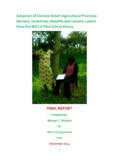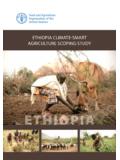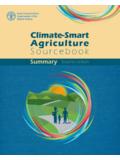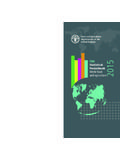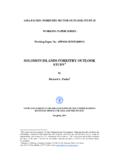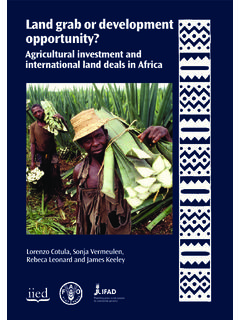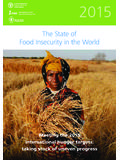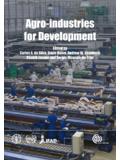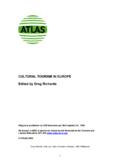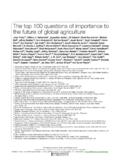Transcription of Combating Micronutrient Deficiencies: Food …
1 Combating Micronutrient deficiencies : food -based Approaches Combating Micronutrient Edited by deficiencies : Brian Thompson and Leslie Amoroso food and Agriculture Organization of the United Nations food -based Approaches Micronutrient deficiencies affect more than two billion people in the world today. With long-ranging effects on health, learning ability and productivity they contribute to the vicious cycle of malnutrition, underdevelopment and poverty. food -based approaches, which include food production, dietary diversification and food fortification, are sustainable strategies for improving the Micronutrient status of populations and raising levels of nutrition. Combating Micronutrient deficiencies : food -based Approaches focuses on practical, sustainable actions for overcoming Micronutrient deficiencies through increased availability, access to and consumption of adequate quantities and appropriate varieties of safe, good quality food .
2 The volume brings together the available knowledge, success stories and lessons learned to demonstrate that food - based approaches are viable, sustainable and long-term solutions to overcoming Micronutrient malnutrition. This booklet is a summary of the publication and contains the abstracts and the list of key words for each chapter. Combating Micronutrient deficiencies : food -based Approaches is a useful resource for policymakers, agronomists, food and nutrition security planners, programme implementers and health workers. FAO related publications L. Allen, B. de Benoist, O. Dary, R. Hurrell J. Aphane, Chadha, Oluoch Guidelines on food fortification with micronutrients Increasing the Consumption of Micronutrient -rich World Health Organization and food Foods through Production and Promotion of and Agriculture Organization of the United Nations Indigenous Foods France, 2006, 341 pp with 1 CD-ROM food and Agriculture Organization of the United ISBN 92 4 159401 2 Nations and The World Vegetable Center- AVRDC.
3 English only: 2003, 77 pp ISBN 92-9058-130-2. English only: Edited by Preventing Micronutrient Malnutrition: Preventing Micronutrient Malnutrition: A Guide to food -based Approaches A Guide to food -based Approaches Brian Thompson and Leslie Amoroso A manual for policy makers and programme Why policy makers should give priority to planners food -based strategies food and Agriculture Organization of the United food and Agriculture Organization of the United Nations and international Life Sciences Institute Nations and international Life Sciences Institute international Life Sciences Institute, Washington international Life Sciences Institute, Washington DC, DC, USA, 1997, 105 pp USA, 1997, 11 pp ISBN 0-944398-89-8 ISBN 0-944398-94-4. English only: English only: Combating Micronutrient De ciencies: food -based Approaches Combating Micronutrient De ciencies: food -based Approaches Edited by Brian Thompson Senior Nutrition Of cer Nutrition and Consumer Protection Division food and Agriculture Organization of the United Nations and Leslie Amoroso food and Nutrition Security Consultant Nutrition and Consumer Protection Division food and Agriculture Organization of the United Nations Published by food and Agriculture Organization of the United Nations and CABI is a trading name of cab international cabi Head Office CABI North American Office Nosworthy Way 875 Massachusetts Avenue Wallingford 7th Floor Oxfordshire OX10 8DE Cambridge, MA 02139.
4 UK USA. Tel: +44 (0)1491 832111 Tel: +1 617 395 4056. Fax: +44 (0)1491 833508 Fax: +1 617 354 6875. E-mail: E-mail: Website: FAO 2011. All rights reserved. FAO encourages reproduction and dissemination of material in this informa- tion product. Non-commercial uses will be authorized free of charge upon request. Reproduction for resale or other commercial purposes, including educational purposes, may incur fees. Applications for permission to reproduce or disseminate FAO copyright materials and all other queries on rights and licenses, should be addressed by e-mail to or to the Chief, Publishing Policy and Support Branch, Office of Knowledge Exchange, Research and Extension, FAO, Vialy delle Terme di Caracalla, 00153 Rome, Italy. A catalogue record for this book is available from the British Library, London, UK. Library of Congress Cataloging-in-Publication Data Combating Micronutrient deficiencies : food -based approaches / edited by Brian Thompson and Leslie Amoroso.
5 P. ; cm. Includes bibliographical references and index. ISBN 978-1-84593-714-0 (alk. paper). 1. Malnutrition--Prevention. 2. Trace elements in nutrition. 3. Enriched foods. I. Thompson, Brian, 1953- II. Amoroso, Leslie, 1977- III. food and Agriculture Organization of the United Nations. IV. international . [DNLM: 1. Nutrition Disorders--prevention & control. 2. Micronutrients. 3. Nutritional Physiological Phenomena. WD 100]. 2011. '39--dc22. 2010026020. Published jointly by CAB international and FAO. food and Agriculture Organization of the United Nations (FAO). Viale delle Terme di Caracalla, 00153 Rome, Italy website: ISBN-13: 978 1 84593 714 0 (CABI). ISBN-13: 978 92 5 106546 4 (FAO). The designations employed and the presentation of material in this publication do not imply the expression of any opinion whatsoever on the part of the food and Agricultre Organization of the United Nations concerning the legal status of any country, territory, city or area or of its authorities, or corncerning the delimitation of its frontiers or boundaries.
6 The mention of specific companies or products of manufacturers, whether or not these have been patented, does not imply that these have been endorsed or recommened by the FAO in preference to others of a similar nature that are not mentioned. The views expressed herein are those of the authors and do not necessarily represent those of FAO. Commissioning editor: Nigel Farrer Production editor: Fiona Chippendale Typeset by SPi, Pondicherry, India. Printed and bound in the UK by the MPG Books Group. Contents Foreword ix Preface xi Acknowledgements xv About the Editors xvii Contributors xix Introduction 1. B. Thompson and L. Amoroso 1. Strategies for Preventing Multi- Micronutrient De ciencies: a Review of 7. Experiences with food -based Approaches in Developing Countries Gibson 2. Addressing Micronutrient Malnutrition to Achieve Nutrition Security 28. P. Shetty 3. Agricultural Interventions and Nutrition: Lessons from the Past 41.
7 And New Evidence M. Arimond, C. Hawkes, Ruel, Z. Sifri, Berti, Leroy, Low, Brown and Frongillo 4. A 3-year Cohort Study to Assess the Impact of an Integrated food - and 76. Livelihood-based Model on Undernutrition in Rural Western Kenya J. Fanzo, R. Remans, Pronyk, J. Negin, J. Wariero, P. Mutuo, J. Masira, W. Diru, E. Lelerai, D. Kim, B. Nemser, M. Mu iz, C. Palm, P. Sanchez, S. Ehrlich Sachs and Sachs 5. food -based, Low-cost Strategies to Combat Micronutrient De ciencies: 92. Evidence-based Interventions in Lesotho and Malawi Aphane, N. Pilime and Saronga v vi Contents 6. Animal-source Foods as a food -based Approach to Address Nutrient 117. De ciencies and Functional Outcomes: a Study among Kenyan Schoolchildren Neumann, Bwibo, Gewa and N. Drorbaugh 7. Small-animal Revolving Funds: an Innovative Programming Model 137. to Increase Access to and Consumption of Animal-source Foods by Rural Households in Malawi MacDonald, Main, Namarika, Yiannakis and Mildon 8.
8 Aquaculture's Role in Improving food and Nutrition Security 150. B. Thompson and R. Subasinghe 9. A Home Gardening Approach Developed in South Africa to Address 163. Vitamin A De ciency M. Faber and S. Laurie 10. AVRDC The World Vegetable Center's Approach to Alleviate Malnutrition 183. Chadha, Engle, J. d'A. Hughes, Ledesma and Weinberger 11. Introducing Vegetables into the India Mid-day Meal (MDM) Programme: 198. the Potential for Dietary Change E. Muehlhoff, R. Ramana, H. Gopalan and P. Ramachandran 12. Developing Micronutrient -rich Snacks for Pre-conception and Antenatal 214. Health: the Mumbai Maternal Nutrition Project (MMNP). D. Shivashankaran, S. Gurumurthy, Kehoe, Chheda, Margetts, P. Muley-Lotankar, A. Agarwal, N. Brown, Sahariah, V. Taskar, Fall and Potdar 13. Approaches and Lessons Learned for Promoting Dietary Improvement in 224. Pohnpei, Micronesia L. Englberger, A. Lorens, M. Pretrick, B. Raynor, J.
9 Currie, A. Corsi, L. Kaufer, Naik, R. Spegal and Kuhnlein 14. A food Systems Approach to Increase Dietary Zinc Intake in Bangladesh 254. based on an Analysis of Diet, Rice Production and Processing Mayer, Latham, Duxbury, N. Hassan and Frongillo 15. Combating Iron De ciency: food -based Approaches 268. B. Thompson 16. Human Micronutrient De ciencies: Linkages with Micronutrient 289. De ciencies in Soils, Crops and Animal Nutrition M. Nub and Voortman 17. Nationwide Supplementation of Sodium Selenate to Commercial Fertilizers: 312. History and 25-year Results from the Finnish Selenium Monitoring Programme G. Alfthan, P. Aspila, P. Ekholm, M. Eurola, H. Hartikainen, H. Hero, V. Hietaniemi, T. Root, P. Salminen, Ven l inen and A. Aro 18. Leaf Concentrate and Other Bene ts of Leaf Fractionation 338. Davys, Richardier, D. Kennedy, O. de Mathan, Collin, J. Subtil, E. Bertin and Davys Contents vii 19. Disability-adjusted Life Years (DALYs): a Methodology for Conducting 366.
10 Economic Studies of food -based Interventions such as Bioforti cation S. P rez Su rez Index 381. FAO's Publications on food -based Approaches to Prevent and Control Micronutrient De ciencies Covers This page intentionally left blank Foreword The importance of food -based approaches for the prevention and control of Micronutrient de ciencies as well as for the improvement of nutrition in general is fully recognized by the food and Agriculture Organization of the United Nations (FAO). FAO, a specialized UN. agency, has as its mandate the raising of levels of nutrition and ensuring humanity's freedom from hunger by promoting sustainable agricultural and rural development. Focusing on the unique relationship between agriculture, food and nutrition, FAO works actively to protect, promote and improve established food -based systems as the sustainable solution to ensure food and nutrition security and, by doing so, to achieve the nutrition-related Millennium Development Goals (MDGs).


